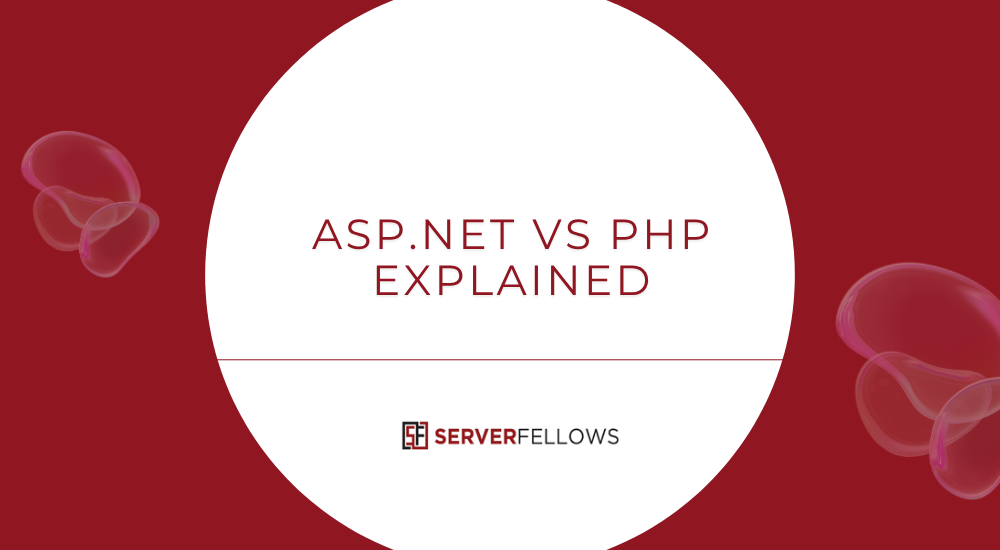
ASP.NET vs PHP Comparison: Which Framework Should You Choose?
Choosing the right web development framework can define the efficiency, scalability, and maintainability of your online presence. In this Asp.net vs PHP comparison, we’ll explore both ASP.NET and PHP — two of the most widely used server-side technologies that power millions of websites globally. Understanding their strengths, limitations, and best-fit scenarios will help you select the framework that aligns with your project goals.
Serverfellows.com offers optimized hosting solutions for both technologies, making deployment and scaling more accessible for businesses of all sizes.
Key Takeaways
- ASP.NET is a .NET-based web framework, mainly using C#, ideal for enterprise-grade applications, APIs, and dynamic sites.
- PHP is a server-side scripting language known for simplicity, flexibility, and widespread support on almost any web server.
- ASP.NET Core brings cross-platform deployment, modular design, and superior performance.
- PHP excels in CMS-driven sites, e-commerce, and projects that need rapid setup and easy hosting.
- Choose ASP.NET for strong architecture and Microsoft integrations; select PHP for portability and budget-conscious web development.
Understanding ASP.NET
ASP.NET is an open-source framework from Microsoft that allows developers to build dynamic web apps, APIs, and real-time services. Built on the .NET platform, it primarily uses C#, though other .NET languages are supported. Unlike standalone scripting languages, ASP.NET provides a structured ecosystem of libraries, compilers, and tools that simplify large-scale web development.
Originally a Windows-centric framework, ASP.NET evolved into ASP.NET Core, a fully cross-platform version capable of running on Linux, macOS, and Windows. This flexibility enables developers to deploy apps seamlessly across multiple environments without sacrificing performance.
For businesses or agencies managing multiple projects, ASP.NET’s integration with modern DevOps pipelines makes it easier to automate updates, monitor performance, and maintain consistent uptime. Hosting providers like Serverfellows.com support scalable infrastructure options suited for such deployment needs.
Core Features of ASP.NET
ASP.NET’s success lies in its robust ecosystem, efficient request handling, and flexibility. Here are its standout features:
- High Performance – ASP.NET Core boasts asynchronous request pipelines, fast runtime compilation, and optimized memory management.
- Modular Architecture – Developers can add or remove middleware components, customizing pipelines for web APIs, MVC apps, or microservices.
- Cross-Platform Deployment – Deploy apps to Linux, Windows, or macOS, supporting both containers and virtual machines.
- Built-in Dependency Injection – Simplifies code testing and promotes cleaner architecture.
- Real-Time Communication with SignalR – Enables live chat, notifications, and streaming applications with ease.
- First-Class Tooling Support – Deep integration with Visual Studio and command-line interfaces for smoother development workflows.
- Security and Authentication – Out-of-the-box identity management, secure cookies, and integration with OAuth and Azure AD.
With ASP.NET Core’s modularity, developers can build high-performance websites and APIs designed for modern scalability — whether hosting a small application or a complex SaaS. For reliable deployment environments, managed ASP.NET hosting from Serverfellows.com ensures optimized server performance and uptime.
Understanding PHP
PHP (Hypertext Preprocessor) remains one of the world’s most widely used languages for web development. It’s an open-source server-side language built to generate dynamic web content. PHP scripts run on the server and produce HTML output, which is then delivered to the browser.
PHP’s longevity stems from its simplicity and versatility. Developers can embed PHP directly into HTML, enabling quick prototyping and seamless page rendering. With PHP, projects like blogs, forums, and e-commerce platforms (e.g., WordPress, WooCommerce, and Magento) are quick to set up and manage.
Because PHP runs efficiently on low-cost shared hosting and integrates easily with databases like MySQL and PostgreSQL, it continues to dominate smaller business websites and startups. Platforms like Serverfellows.com provide PHP-ready environments that allow developers to deploy instantly without complex configuration.
Core Features of PHP
PHP’s enduring popularity can be attributed to its strong community support and simplicity. Here are its defining characteristics:
- Cross-Platform Compatibility – Runs on major operating systems such as Linux, macOS, and Windows.
- Ease of Integration – Embeds naturally within HTML, supporting inline scripting and dynamic rendering.
- Composer Package Management – Offers a massive ecosystem of reusable libraries for faster development.
- Database Flexibility – Connects effortlessly with MySQL, MariaDB, PostgreSQL, SQLite, and even NoSQL databases.
- Open Source and Free – No licensing fees, reducing total project costs.
- Lightweight Hosting – PHP is supported by nearly all web servers, making deployment simple and affordable.
PHP’s balance of simplicity and capability allows it to remain a go-to choice for freelancers, startups, and enterprises alike. Its community-driven ecosystem ensures constant improvement and abundant documentation.
PHP vs ASP.NET: Key Differences and Use Cases
Understanding how these technologies differ can clarify which best fits your development goals. The Asp.net vs PHP comparison highlights several key contrasts in architecture, performance, scalability, and cost.
| Aspect | ASP.NET | PHP |
|---|---|---|
| Type | Framework built on .NET platform | Standalone scripting language |
| Primary Language | C#, F#, VB.NET | Native PHP syntax |
| Platform Support | Cross-platform (Windows, Linux, macOS) | Cross-platform |
| Performance | High, with asynchronous processing | Moderate, depends on server configuration |
| Hosting | Often Windows-based or cloud-native | Available on nearly all servers |
| Security | Strong enterprise-level integration | Requires manual setup for best practices |
| Best For | Enterprise systems, APIs, SaaS | CMS, e-commerce, small to mid sites |
| Learning Curve | Moderate to steep | Beginner-friendly |
When to Choose ASP.NET
- You need enterprise-grade applications with multiple layers and integrations.
- Your team uses Microsoft tools like Azure, SQL Server, or Visual Studio.
- You require structured code and modern DevOps support.
When to Choose PHP
- You’re building a CMS-based or content-heavy website.
- Your budget prioritizes affordability and rapid deployment.
- You rely on open-source tools and community-driven frameworks.
Both frameworks can achieve exceptional scalability and performance when deployed correctly. Hosting on optimized infrastructure — such as Serverfellows.com — ensures that your application runs smoothly regardless of which stack you choose.
Cost and Licensing Comparison
From a cost perspective, PHP is often more budget-friendly. It’s free, open-source, and runs efficiently on inexpensive Linux hosting plans. Many developers leverage shared servers or VPS setups for minimal cost.
ASP.NET Core is also open-source, but its ecosystem may involve optional costs — such as Windows Server licenses, SQL Server, or Visual Studio Enterprise editions. However, developers can offset these with free Linux-based hosting or Azure credits available through cloud providers.
Ultimately, both technologies offer scalable paths that can be tailored to your budget, especially with managed hosting services from providers like Serverfellows.com.
Security Considerations
Security remains a top concern for any web framework. ASP.NET offers built-in features like:
- Authentication and authorization frameworks
- CSRF and XSS protection
- Secure cookie handling
- Integrated identity management
Meanwhile, PHP developers often rely on frameworks like Laravel or Symfony, which implement similar security mechanisms through middleware and dependency injection. Regardless of platform, adopting HTTPS, input validation, and regular patching remains essential.
A secure hosting partner like Serverfellows.com can enhance protection with firewall configurations, SSL setup, and regular server monitoring.
Migration Challenges
Migrating between PHP and ASP.NET involves more than syntax translation. PHP’s dynamic structure differs from ASP.NET’s object-oriented framework. Porting small websites may be manageable, but complex systems often require architectural rewrites.
To reduce migration risks:
- Use APIs for gradual transition.
- Maintain parallel testing environments.
- Leverage automated tools where possible.
- Host both stacks temporarily during migration through providers like Serverfellows.com to minimize downtime.
Database Compatibility
Both frameworks integrate well with relational and non-relational databases:
- ASP.NET pairs natively with SQL Server, Azure SQL, and PostgreSQL.
- PHP commonly uses MySQL, MariaDB, or SQLite.
For scalable apps, both stacks also support MongoDB, Redis, and ElasticSearch, depending on architecture needs.
Performance Overview
Performance is a deciding factor in many Asp.net vs PHP comparison analyses.
- ASP.NET Core utilizes just-in-time (JIT) compilation and asynchronous programming, resulting in faster execution and higher throughput.
- PHP 8+ has made major strides with its JIT compiler, significantly narrowing the performance gap.
For best results, choose optimized hosting infrastructure like Serverfellows.com, which ensures server-side caching, fast response times, and automatic scaling.
FAQs About ASP.NET and PHP
1. Which is easier to learn?
PHP is generally easier for beginners, while ASP.NET has a steeper learning curve but offers stronger long-term scalability.
2. Can both be used for APIs?
Yes. ASP.NET Core and modern PHP frameworks like Laravel can both build RESTful and GraphQL APIs efficiently.
3. Are both open source?
Yes, both are open source with thriving communities.
4. Which is faster?
ASP.NET Core often delivers higher performance benchmarks, but PHP 8+ now offers comparable speeds for most web workloads.
5. Which is better for long-term enterprise use?
ASP.NET typically wins in enterprise contexts due to its strong type safety, scalability, and Microsoft ecosystem support.
Conclusion
Both ASP.NET and PHP are proven, battle-tested solutions for web development. The final decision in this Asp.net vs PHP comparison depends on your project goals, development skillset, and infrastructure preferences.
- Choose ASP.NET for enterprise-grade applications that demand structure, scalability, and integration with Microsoft tools.
- Choose PHP for simplicity, fast development cycles, and broad hosting compatibility.
In either case, hosting your project on a reliable, high-performance platform like Serverfellows.com ensures smoother deployment, improved uptime, and robust security — no matter which framework you choose.


